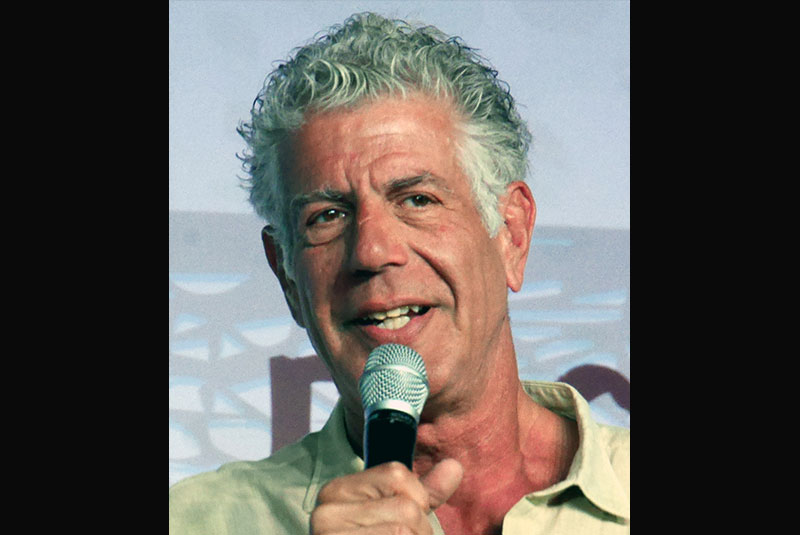Bourdain: ‘I’ve got to have lechon & sisig in my New York market’


Anthony Bourdain passionately wants to bring heritage world street food to New York City, with our very own lechon and sisig included.
With two major food congresses held in Manila this year — Madrid Fusion Manila and the World Street Food Congress — it was highbrow vs. lowbrow, avant-garde vs. traditional, fine dining vs. street food. They may have been on opposite ends of the spectrum, but they did not exactly compete. Rather, they complemented each other. It was biting the two ends of the same sausage, two sides of the same coin. It was a win-win year for the Department of Tourism, positioning the Philippines as the new culinary center of Asia.
The just-concluded World Street Food Congress 2017, the second to be held in the country, is the world’s only conference on heritage and street-food culture. The organizers’ objective was to put together industry players, individuals and companies to discuss, share, ideate and collaborate, and to get participants to think, act and react in this progressive and dynamic heritage food culture.
The congress had two components: the two-day Dialogue with some 14 guest speakers (including this writer) with the theme “Re-Imagine Possibilities,” and the five-day Jamboree, where you’d find the most toothsome reimagined street food from 28 food vendors from 12 countries, including 10 vendors from the Philippines. (For a complete listing of guest speakers, food vendors and their respective specialties, visit https://wsfcongress.com/world-street-food-congress/).
The World Street Food Congress is the brainchild of KF Seetoh, a TV host, author, and founder of Makansutra. He has been dubbed the “guru of grub.” Co-hosting the congress was our kabalen Sau del Rosario, chef/owner of Café Fleur and 25 Seeds Restaurant, both located in Angeles City.
Anthony Bourdian, the most anticipated among the speakers, came in last on the second day. The international food and travel rock star gave an update on his forthcoming Bourdain Market in New York, to open in 2018. He also came to scout potential partners and vendors for the project, with Seetoh tapped as a consultant for Asia to the Bourdain Market.
Bourdain spoke eloquently on the compelling need to save heritage street food. “Street food is under threat,” he said. “It is seen, first of all, as unsanitary. It’s seen as a quality-of-life hazard, meaning, ‘Who are these dirty people in their trucks, stands, or corners?’ It smells, it doesn’t fit in the real estate, and it’s taking away business from the brick-and-mortar standing restaurants. I say that’s a lot of bulls**t, particularly in New York. New York is a city of immigrants. It’s not a place. It’s an idea. It’s a place where everybody is from someplace else. We have representatives of people and culture from all over the planet. It’s been that way from the very beginning. And, shockingly, scandalously enough, we don’t have a real market. We don’t have a place like Singapore has, or Hong Kong’s dai pai dong — a place where we can go, a democratic space where people value a good bowl of noodles, or the best hargaw (shrimp siomai) in town for $1.95.”
The Bourdain Market will be patterned after the Singapore experience with hawkers and the birth of the hawker center, he explained.
“And this is a thing which has always enticed and attracted me — maybe sparked emotionally again — to Singapore. First of all, you have a problem. You have street vendors, and you have a state government who doesn’t like dirt. They managed in Singapore, in my mind anyway, to solve the problem in an elegant way. They, at least, understood that street food — these heritage street vendors, multi-generational operations, people who have been doing more or less the same thing very, very well over time — that these were businesses worthy of saving. This is something to be treasured and preserved. We have seen the terrible onslaught of fast-food restaurants and generic chains.
“Singapore, at least, understood this is a good thing,” Bourdain continued. “They found a way to save it and move it all indoors in enclosed spaces. They imposed certain regulations to ensure safe food handling. But you can still go to those cleanest, most orderly city states, and you can line up, people rich and poor, all of whom value that $2.95 bowl of noodles just as much as something in a fancy restaurant. They understand and appreciate that it is a vital thing worth hanging on to. Why don’t we have this in New York, or Europe, or the rest of the world, for that matter? It’s shocking to me. We like food. We’re enthusiastic about food. We blog about food. We Instagram it relentlessly. We can’t even enjoy food without taking pictures of it and sharing it with other people on the web.
“Why can’t we have this? This is a question I and Seetoh and many others have been asking ourselves in New York and why we’ve been trying to put together this enormous project that would place specifically some of the people who do what they do so well for a very, very long time.”
And yes, he announced, that our lechon and sisig are definitely on his list for the Bourdain Market. “Sisig is a necessity,” Bourdain said, telling CNN that it would “win the hearts and minds of the world.”
“I’ve got to have it in the Bourdain Market,” he said. Mabuhay ang lechon at sisig!



















